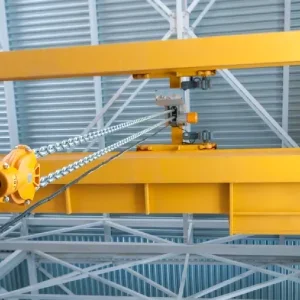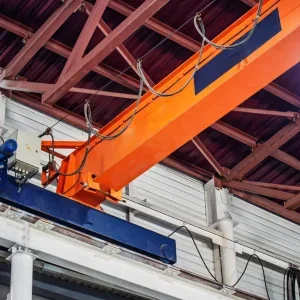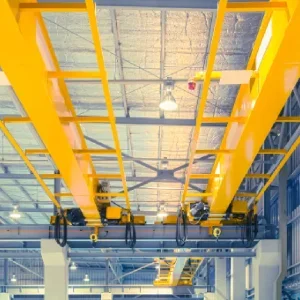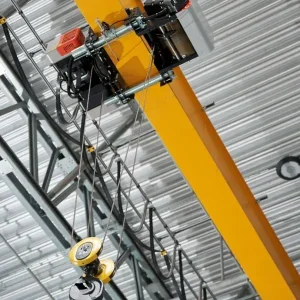Most people would prefer to work in a clean and safe environment but when that environment is the manufacturing of food or pharmaceutical products, those two factors become a necessity rather than a preference. And sectorspecific, customised lifting equipment plays an important role in cleanroom workplaces. "Food and drug safety and quality is an ever increasing public concern," said Joe Ruynon, vertical market specialist – oil and gas at Columbus McKinnon. "Manufacturers must take all necessary steps to eliminate risk of contamination, while controlling costs and maintaining or increasing productivity," he continued.
Food grade coatings and lubricants, along with stainless steel load hooks, chains and cables and watertight (NEMA 4X) control enclosures are among the most commonly requested features. However, requirements differ not just between the food processing and pharmaceutical industries but they can vary widely within a single industry, depending on the processes being delivered.
"For example, requirements in a dry, noncaustic environment may focus more on controlling risks of contamination by using food grade lubricants and drip pans for gear boxes," said Ruynon. "In wet areas the needs focus more on corrosion resistance. And in wash-down areas equipment must be sealed to permit high pressure cleaning. Some areas may require a combination of these features." Matt Downing, director of sales and marketing at the David Round Company agrees that there can never be a ‘one size fits all’ approach.
"It all comes down to each facility and its quality and safety requirements when handling the food or pharmaceutical product that ultimately goes to the consumer," he said. "The requirements have been more stringent in the pharmaceuticals market but the food market is catching up where safety is the priority."
He added that, generally speaking, if the lifting equipment was either handling these products or operating directly above them, then stainless steel construction was the order of the day.
That’s the experience of Hoist UK, too. "The main demand [from the food and pharmaceutical sectors] is for uniform, stainless steel, non-horizontal polished surfaces that can be cleaned easily," said Paul Jordan, director of Verlinde distributor Hoist UK.
He added that since moving into the cleanroom sector, Hoist UK has experienced increasing demand for its products and attributes this to "being able to supply serially produced products with minimal alterations, or heavily customised products that are always perfectly suited to the application".
"For example, we’ve spent a considerable amount of time designing structural stainless steel members for gantry and crane bridge beams that are designed with no horizontal surfaces and are polished to BPE SF3 surface finish (0.76 micron)."
Another key consideration is lubrication – after all, nobody wants non-food grade oil dripping onto their ready-made lasagne as it passes by on the production line below. "In an ideal scenario there would be no lubricants, but that’s not always possible," said Jordan.
He added that Hoist UK’s solution is the BH series electric belt hoist from Verlinde. "We have the ability to fit this unit with a lubricationfree Dyneema lifting belt and, of course, all the lubricants in gearboxes and so on can be biodegradable."
Columbus McKinnon offers trolleys in a quarter ton through to two ton capacity that are manufactured from 100% stainless steel and that feature sealed stainless steel bearings that are "lubricated for life".
"We see these as the ultimate cleanroom trolley as they can be paired with most hook suspended hoists of the same capacity they are impervious to corrosion in most environments, are suitable for wash-down and have virtually no risk of contaminating processes in the area where they are used," said Ruynon.
Stainless steel may be the preferred material, but it’s not always the one that’s actually specified, which is why manufacturers often offer hybrid solutions.
"We have the ability to provide hoists that are 100% stainless steel but the cost of stainless steel gearing, brake parts and other enclosed components is prohibitive for many customers," said Ruynon.
"For these customers we offer a list of stainless steel and nickel-plated features for exposed surfaces such as hooks, chains, chain wheels, sheaves, gear housings, control enclosures and so on, from which the customer can choose. By offering an ‘á la carte menu’ we can allow customers to tailor a lifting solution for their specific application while managing the cost."
Hoist UK said that some of the products it sells into cleanroom and hygienic applications are more standard serially produced products which then have components changed at Verlinde to be more compliant with the working environment they are destined for, before further modifications at Hoist UK’s own works. "Our range of cleanroom and hygienic equipment is based on the level of cleanliness a customer requires, so that could be a unit based on a standard industrial unit with additional items such as a stainless steel bottom block, hooks and wheels, right up to equipment manufactured completely in stainless steel," said Jordan.
"Our Verlinde range of equipment gives us the best platform of a unit to start this customization programme for a customer, without having to design a hoist from scratch, although we have developed a range of small cleanroom wire rope hoists of our own for suitable low duty applications of 250kg SWL and below".
The David Round Company is well known for its all stainless steel hoists – it is the preferred stainless steel hoist and crane provider for Johnson & Johnson, Bristol Myers Squibb, Genzyme, Pfizer, Merck and Baxter Healthcare, for example – but it, too, offers hybrid designs for those applications where certain components, such as the chain, hook and wheels are required to be stainless but the rest of the hoist isn’t. These products, pointed out Downing, are usually ones that aren’t directly handling the food or pharmaceutical products but which are still operating in a clean environment.
And, he added, while cost is always a factor, it doesn’t necessarily drive all purchasing decisions.
"It’s different for every customer but once we are spec’d in, then cost becomes secondary to having the right product for the environment."
Paul Jordan agrees that the initial price tag isn’t always the over-riding factor and that whole life costs are becoming increasingly relevant, too.
"Sometimes it is specification that drives the product selection and not the cost," he said. "You need to understand [the customer’s] process and discuss operating times of the equipment, loading cycles and their loading spectrum so that you can correctly specify the right piece of equipment for their particular application."
This whole life costing approach takes in factors such as ease of maintenance. Downtime is a problem for any manufacturing process but when the risk of introducing contaminants during routine servicing or repairs is added into the mix, it becomes a major concern.
In this respect, prevention is always better than cure and the correct product specification at the outset pays dividends. "It’s why our stainless steel strap hoists have become more and more popular," said Downing. "There are no chains or wire ropes to lube – and that means less downtime for maintenance."
Building reliability and durability into products to reduce the need for costly repairs is also important, added Ruynon. "That said, the owner of the equipment also owns a stake and must ensure that equipment is properly inspected and maintained, not only to reduce unplanned downtime, but also to ensure the safety of their employees."
Paul Jordan added that, of the cleanroom and hygienic hoisting units and systems Hoist UK has provided to date, the FEM duty of the system has not seemed to be a major factor as the lifting operations in the cleanroom applications have always been relatively low in relation to other types of industrial lifting.
"Our units are always significantly higher than their required FEM duty rating, which helps ensure that the product has a longer physical operating lifetime for the customer."
Notwithstanding the longevity of the product, however, maintenance and servicing is essential and Jordan pointed out that, in the UK, thorough examinations need to be carried out under the Lifting Operations and Lifting Equipment Regulations (LOLER).
"This type of equipment is not exempt from LOLER and pharmaceutical and hygienic equipment customers need to be aware of this issue and factor it into the PPM schedules of their other equipment and facilities as breakdown maintenance isn’t really possible in an ISO-rated cleanroom operation," he said. On the subject of legislation, the US Food and Drug Administration (FDA) has been evaluating regulations but with no conclusion to date.
"We had heard that the FDA was considering regulations a year or two ago but to my knowledge no new rules have been issued specific to hoists for food processing use," said Ruynon. "I believe this is largely in part to the broad spectrum of applications within the industry and the unique equipment needs within each of those applications, which makes it very difficult to develop broad based regulations."
As a result, the operators are self-regulating, to a degree.
"The FDA is evaluating requirements on an ongoing basis and while no specific legislation has been passed, the safety and quality engineers and managers at the end user level mandate those requirements for their own operations," said Downing






